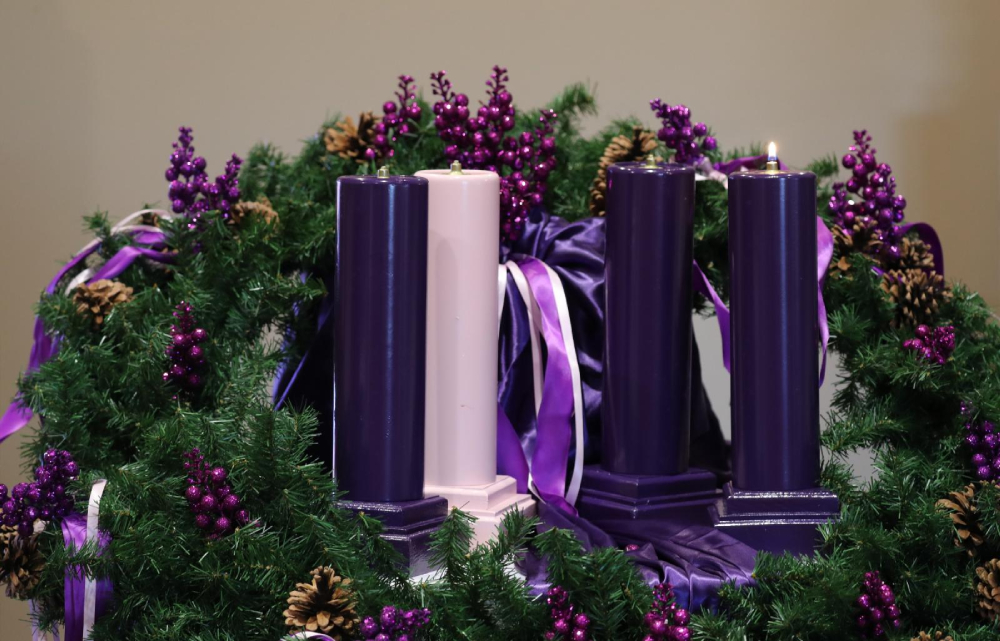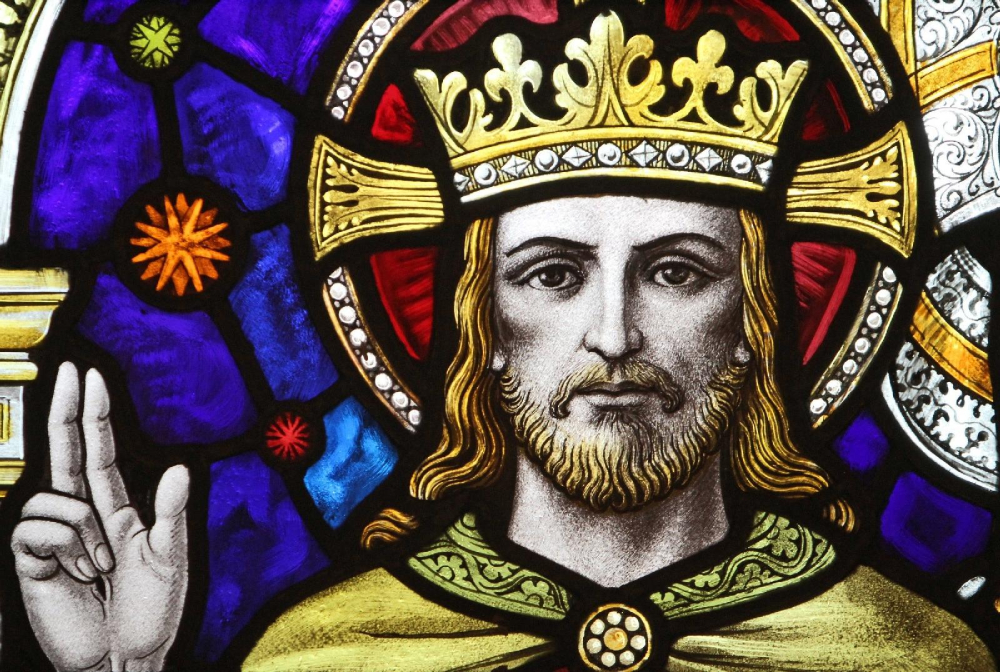<h2><a style="color: #04619d; text-decoration: none;" href="https://www.ncronline.org/spirituality/when-christ-looks-you-through-ey… Christ looks at you through the eyes of a 3-year-old</a></h2><div style="font-weight: bold; font-size: 15px; font-family: Arial, sans-serif;" class="byline">by Dani Clark</div><div style="font-size: 19px; font-family: 'Georgia', serif;"><p>Soul Seeing
<h2><a style="color: #04619d; text-decoration: none;" href="https://www.ncronline.org/opinion/ncr-voices/will-bishops-follow-pope-l… the bishops follow Pope Leo's lead?
Secondary 550 Ad
<h2><a style="color: #04619d; text-decoration: none;" href="https://www.ncronline.org/spirituality/feast-dedication-lateran-basilic… of the Dedication of the Lateran Basilica: A dim shadow</a></h2><div style="font-weight: bold; font-size: 15px; font-family: Arial, sans-serif;" class="byline">by Mary M.

One purple candle is lit on an Advent wreath, the central symbolic rite of spiritual preparation for Christmas. Purple is the color of penitence and humility. The rose colored candle, lit the Third Week of Advent, represents a hopeful look toward Christ's coming. (OSV News/Bob Roller)
This last day of November ends another calendar month and moves us closer to December 21, the winter solstice and the shortest day of the year, when we will be plunged into deeper darkness. Meanwhile, the liturgical season of Advent begins. These next few weeks will find us waiting for the dawn of a new day, embodied in the arrival of the Christ Child whose birth is supposed to usher in a time of peace, one that is forever on the horizon but yet to be realized.
Advent is a time of waiting. But what are we waiting for? Surely the Second Coming will not arrive on December 25, 2025 — or will it?
Reflecting on our present time, we cannot help but be shaken to our core at how immigrants are being treated by other human beings, outfitted in military gear and face coverings. Under the guise of keeping the peace these agents instead instill fear in those on the margins who have little or no power to resist. Elsewhere, artificial intelligence data centers are being built with rapid speed, changing the course of how and what we think, how we live our lives and how we will relate— or not relate — to one another in the future. Already, communities in high tech regions are experiencing AI’s drain on water supplies, especially in areas receiving less rainfall because of climate change. And political, social, economic, cultural and religious wars rage on.
Yet even in times such as these, hope dawns; we move from Ordinary Time to the season of Advent with a prophetic vision lighting our path.
People in biblical times experienced similar traumas, upheavals, tragedies and devastations. And yet, they were never without a word of hope. Today’s first reading from the book of Isaiah captures the spirit of anticipation and hope.
The poem opens on a futuristic note, "in days to come." The prophetic vision of peace and unity remains a vision, but one that we can hope for and work toward. The vision anticipates a time when nations will come together, focused on a common journey, ready to receive instruction from the One who sets the tone for relationships among the nations. The Holy One does not act like a judge and does not condemn any of the nations; rather, the Holy One arbitrates among them. When the negotiation takes place, the people can beat their swords into plowshares and their spears into pruning hooks, never again to take up the weapons of war against each other or to learn war. The way to peace is not through violence and bloodshed; rather, it is through instruction and arbitration, initiated, in this poem, by God.
We who are baptized into the Catholic faith are baptized into the prophetic; it is our vocation and our calling. We are the recipients of this marvelous vision in these tumultuous times of global crises. The vision calls us to remain faithful to a non-violent way of life, no matter how polarized our world is and will continue to become. The vision provides us with the impetus for hope: hope that one day all communities of life will live in peace, the fruit of justice.
Advertisement
But this vision also reminds us that we are not just the recipients of this vision, but the ones who work to make this vision a lived experience. Each of us is imbued with the prophetic spirit of the divine. Each of us has the potential and capacity to exercise our prophetic vocation and calling, and in doing so, to enflesh the presence of the divine in the here and now. The more we embody the Holy One — the one who negotiates and arbitrates among all peoples and across all cultures and nations — the more we offer hope to our world that is anticipating the advent of a new time.
Business cannot continue as usual. The letter to the Romans is a clarion call to people everywhere, not just to the early Christian communities. Now is the time for all of us to get our acts together, to look outward instead of focusing on what is continuously self-satisfying. The reading calls for a higher ethic, one based on the Gospel capable of transforming all the sordidness of life.
Would that people in leadership heed this clarion call and work to bring about the vision of peace that has justice as its foundation. What are we all waiting for?

A stained-glass window of Jesus wearing a crown is seen in this 2011 photo at St. Joseph's Seminary in Yonkers, N.Y. (OSV News/Gregory A. Shemitz)
"Save yourself!"
Don’t we hear that hundreds of times a day, in various ways? Save yourself from the embarrassment of psoriasis. Save yourself from paying too much for insurance. Save yourself from strangers by getting a door camera. Save yourself from those who would do your job for lower wages than you get. Save yourself from people horning in on your rights by supporting DEI, from the pernicious effects of vaccines and from anything that would threaten or inconvenience you. Save yourself!
Luke used the word "save" four times in his telling of the crucifixion. The people who told Jesus to save himself did so sneering and jeering, or proposing that saving himself would prove that he was the Christ. Almost everyone who called out to Jesus mocked him as a failed, disgraced messiah.
The only speaker who refused to scorn him also shared his fate. As Jesus’ companion on the hill of Golgotha, the man we call St. Dismas defended Jesus’ innocence. Then, he made an astounding profession of faith in the vulnerable and ridiculed Messiah who was taunted as "King of the Jews." Dismas prayed, "Remember me when you come into your kingdom." That statement of belief articulated the paradox characteristic of the Gospel: a criminal recognized the suffering and humiliated Jesus as the savior. In the innocent suffering victim, Dismas saw a revelation of God, the one whose power the world would never understand.
At Easter, Oriental Catholics and Orthodox Christians sing the perplexing phrase, "By death, he conquered death." This chant implies that Christ freely faced down death and that in his resurrection, God confirmed that Jesus’ love was stronger than death. That opened the way for Jesus’ followers to do the same.
The four gospels portray Jesus’ last hours differently. John depicts Jesus as the author of his own fate saying, "It is finished." Similarly, Luke quotes Jesus’ last words as, "Father, into your hands I commend my spirit." Mark and Matthew offer a more desperate version in which Jesus cried out, "My God, why have you forsaken me?" Still, each account demonstrates Jesus’ trust in the Father — whether or not he understood what the Father was about in what was happening.
The King we celebrate on this final feast of the year is no ordinary ruler. When the people chose David as their king, God confirmed the choice and told David, "You shall shepherd my people and be commander of Israel." God commissioned David to protect and defend his people. Jesus did that in a most uncommon way: he gave his life to reveal the ultimate powerlessness of death and evil. Not only that, but King Jesus actually encouraged his followers to accept a similar martyrdom if it came.
In today’s selection from Colossians, Paul calls Jesus "the image of the invisible God." What does that mean? Pilate presented the captive, beaten Jesus to the crowd saying, "Behold your king." Is that our image of God? Do we believe that the crucified Jesus presents one of the clearest images of God we will see on this earth? It’s a lot easier to think of him walking on water or rising from the grave — but, like it or not, the cross is the primary image we display in our churches.
Advertisement
Paul says that Jesus made "peace by the blood of his cross." There are two ways to interpret that. One tradition says that Jesus’ blood paid God back for human sin. A different perspective suggests that Jesus manifested God’s unrelenting outreach to us. It understands Jesus’ cross as a revelation of how God absorbs evil, overcoming it with love. From this perspective, the cross reveals the depth of God’s desire for us: a passion that cannot be stopped even by the attempted deicide of the crucifixion. The king whom we celebrate today is supremely vulnerable and loving.
Advent begins next Sunday, making this the final week of the church year. This feast and the four Sundays which follow invite us to meditate on just who this King, this God incarnate, really is — and therefore, what it means to be Christ’s disciple.
Paul says that the Father has made us fit to share in the inheritance of the holy ones, delivered us from the power of darkness and transferred us to the kingdom of his beloved Son.
God’s desire is that we participate in Christ’s Kingdom as it is revealed in the life, death and resurrection of Jesus our Christ.
Today’s feast puts us to the test. According to Paul, we have been made fit to follow Christ in absorbing evil without resorting to it. Do we want to live in the reign of a vulnerable God?
Do we want salvation in the mode of Christ the King, or shall we look for another?
Christopher M. Cruz, Ph.D., is an assistant professor of Social Foundations of Education at the University of North Georgia. His first book with Routledge is entitled "Curriculum as Confession: The Promise of Teaching for Selfhood and Truth."

